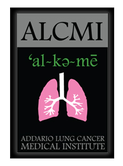 Steve Young, ALCMI This interview was published at www.fastcures.org, as part of the "TRAIN" (The Research Acceleration and Innovation Network) Innovator Spotlight. The Joan Gaeta Lung Cancer Fund is proud to benefit ALCMI. If you live in the Atlanta area, come out on February 25th and go "Dancing for Joan" to raise funds for the work ALCMI is doing!  Q: What prompted the creation of the institute? In late 2007, the Bonnie J. Addario Lung Cancer Foundation invited leading physicians, clinicians, scientists, researchers, representatives from pharmaceutical and biotech companies, venture capitalists, international investors, and lung cancer survivors to convene at a Summit. They were invited for one purpose - to answer the following question: "If money for research and development was not a barrier and a true collaboration could be achieved, what would you do to improve lung cancer patient survival in the least amount of time and how much would it cost?" The unanimous answer: "We need a national lung cancer institute - an honest third-party broker - with a virtual specimen repository, connecting existing biobanks and researchers worldwide through a unique real-time IT platform and better means of collaboration." In response, the Addario Lung Cancer Medical Institute (ALCMI, voiced as "Alchemy") was founded in 2008 by lung cancer survivor Bonnie J. Addario and supporters to positively impact on lung cancer patient survival. ALCMI is a contractual consortium of academic and community-based researchers structured to directly advance the understanding of disease biology and accelerate the development of significantly more effective treatment options. ALCMI links researchers via shared infrastructures and prioritized research programs including standardized biorepositories, data systems, contracts, study protocols, and, as significantly, through ongoing collaboration discussions among the scientists.  Q: Can you briefly describe ALCMI's CASTLE Network and what you hope its outcomes will be? The Collaborative Advanced Stage Tissue Lung Cancer (CASTLE) Network is the only resource of its kind that facilitates the ongoing (longitudinal) collection of matched tissue core biopsies/blood samples from advanced lung cancer patients coupled with routine determination of a panel of documented clinically significant biomarkers. In addition, it goes beyond this to centrally integrate and standardize research tissue samples with corresponding proteomic, genomic, molecular and clinical data across a multitude of institutions and oncology networks in the United States and (soon) Europe. This kind of transformative research resource (defined as a large, well-annotated, uniformly collected, fresh flash-frozen collection of advanced stage lung cancer tissues) simply does not exist anywhere else. These unique resources are being applied to identify and validate optimal molecular targets and drugs/agents active against biologic and molecular targets, as well as enabling correlative studies to determine patients' responses to standard of care and emerging therapies. ALCMI is helping to lead the way as the lung cancer research community's premier, open access source for high quality proteomics, genomics, target validation and correlative science analyses. The biorepository resulting from CASTLE, with funding support from foundations and other philanthropic sources, establishes a unique foundation for collaboration with the National Institutes of Health, other research organizations, and the biopharmaceutical industry - thus bringing new and improved treatment options to lung cancer patients in need. Q: You've put a lot of emphasis on educating and empowering patients about molecular testing. Why is that important? Because of the historically poor outcomes of lung cancer patients, suboptimal therapeutic efficacy, significant side effects of chemotherapy, and the need to choose more efficacious treatment regimens and identify patients most likely to benefit from them, there is a need to predict a priori whether an individual patient's tumor will respond to a particular therapeutic agent. However, virtually all lung cancer tumor samples available today are from resection specimens so direct, intra-patient molecular-clinical therapy correlations are impossible. Patients with more advanced disease, those who are determined to be medically inoperable, and patients whose cancer recurs after surgery, are treated with chemotherapeutic agents, radiotherapy, or a chemotherapy and radiotherapy combination. Only a minority of tumors show objective clinical responses to chemotherapy: the best regimens can induce a clinical response in about 30 to 40 percent of tumors, while targeted inhibitors induce an objective response in about 10 percent of cases. The result is that the survival expectation of advanced stage (comprising 85 percent of all initial diagnoses) lung cancer patients is measured in months, and that the overall five-year survival rate for all patients has remained under 16 percent over the last 40 years. More promisingly, specific molecular features of tumors, particularly EGFR mutations and EML4-ALK fusions, have been shown in multiple studies to have prognostic importance and/or be associated with benefit from specific interventions. Our CASTLE study provides immediate access to molecular markers, thus arming physicians and patients with vital data resulting in improved patient outcomes via customized treatments. Q: What do you consider the institute's greatest achievements to date?
Q: What are your top research goals for 2012, and what will it take to reach those goals?
* Address the scarcity of well-annotated, uniformly collected and processed tissues
0 Comments
Your comment will be posted after it is approved.
Leave a Reply. |
Details
|


 RSS Feed
RSS Feed
